Food
Chinese New Year food: eat your way to a luckier life
by Deborah James
Keep your noodles long, scoff down your dumplings and for goodness' sake – make sure your carp is pointing towards the oldest person at your dinner table. Navigating the traditions of a Chinese New Year dinner can be baffling, so follow these foodie tips to ensure a healthy, happy and wealthy year ahead.
1) Having fish at your feast? Make sure it's positioned correctly on the dinner table – the head should be pointing towards your oldest guest as a sign of respect (we recommend guessing, rather than asking, if you're not sure who gets this dubious honour).
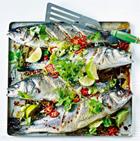
2) The type of fish you choose will bring different types of luck:
- For extra longevity, choose catfish: it has the same pronunciation as 'year surplus' in Chinese.
- If you'd like 2015 to be full of nice pressies, cook up mud carp: this sounds like the Chinese word for gifts.

3) DON'T cut your fish before serving. The head and tail symbolise the end of one year and the beginning of the next, which should not be 'cut short'.
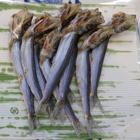
4) Yusheng is a must-have starter at New Year. It's a raw fish salad full of shredded veg. The name translates as 'prosperity toss', with the idea that all diners get involved with their chopsticks, with the most enthusiastic tossers getting the most luck...
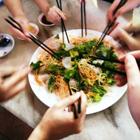
5) Like dumplings? Excellent, you're in luck – literally. Dumplings symbolise wealth – their shape is similar to ancient golden ingots – and the more you manage to eat at your New Year dinner, the more money you'll make in 2015. There's often a coin hidden in one of the dumplings and whoever finds it will have good fortune for the next 365 days. So chew quickly, but carefully.
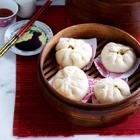
6) Duck symbolises fidelity. But DON'T serve it shredded – it must be whole. Cutting or slicing represents negative symbolism such as splitting up and severing ties.
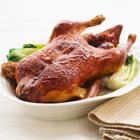
7) Eat noodles – the longer the better, as the length represents your life span. Slurp.
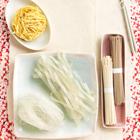
8) Make sure you have a 'tray of togetherness' for any guests that come a calling to pick at. This round platter needs a collection of eight (a lucky number) sweet, dried and candied Asian snacks.
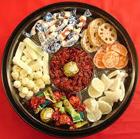
9) The essential dessert at Chinese New Year is nian gao. Why? Well, this Cantonese cake is made from sticky rice and is believed to be an offering to the Kitchen God with the aim of keeping his big mouth shut, so he can't badmouth your family in front of the Jade Emperor. Stick that in your cakehole.
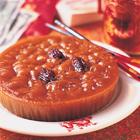
10) If the previous 9 points aren't enough to keep you on your toes (frankly, we're exhausted), here's some more Chinese foodie symbolism you might want to bear in mind:
– Jiu: liqueurs symbolising longevity
– Red chillies: good luck
– Rice: harmony












